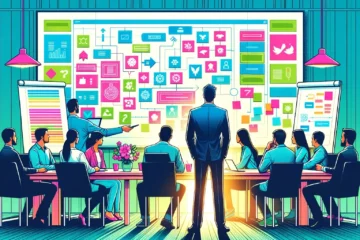As the e-commerce market reaches a new level of maturity and online retail sales growth slows down from pandemic-driven highs, it’s crucial to be innovative in your digital strategy to grow your online market share. To do so, you must understand where companies succeed online and what tactics are worth implementing, given e-commerce enablement technology.
As an experienced e-commerce software development company, Artelogic’s experts share their analysis of E-commerce Trends in 2023 in this article.
Customization in e-commerce
In 2023, e-commerce remains a dominant force, accounting for 47% of retail growth by 2027, according to Euromonitor International. However, the cost of living and the environmental crisis are transforming consumer trends and behaviors, making it even more critical to stay ahead. “Consumers spending responsibly but emotionally, the role of digitization in purchasing processes, female equality demands, and a disruptive Gen Z are some factors that will define global consumer trends in 2023. Customization in e-commerce is the key element of the entire strategy,” – said Volodymyr Khitsiak, Chief Marketing Officer at Artelogic.
For example, do you know that the “Control the Scroll” trend is an ongoing e-commerce phenomenon? People are still wed to their devices, but screen time is more selective. Consumers want an efficient and curated digital experience. Read the following case study to know about that better.
From Abandoned Carts to Sales: How to Reduce Cart Abandonment
Can a minor adjustment in the checkout procedure of an e-commerce website substantially impact the conversion rate? The response is affirmative. Moreover, checkout is one of the most critical parts of customization in e-commerce.
The checkout step is the most crucial part of the consumer’s experience, which necessitates two essential elements: credibility and a seamless flow. This stage is one that clients want to manage exclusively, and any interruption or complexity in the process may cause them to abandon their purchase. As a result, optimizing the checkout process for the consumer is critical to increasing conversion rates.

We suggested three options to decrease cart abandonment:
- Simplify the Checkout Process
Implementing a one-page checkout process can simplify the purchase process and save time for customers. Angular and Node.js can be used to design a responsive and efficient checkout process.
- Personalize the User Experience
A recommendation engine that analyzes customer browsing and purchase behavior can be implemented to suggest products the customer is likelier to purchase. This can enhance the overall user experience. To achieve this, machine learning algorithms can be integrated with the online store’s existing platform. - Offer Multiple Payment Options
Integrating multiple payment gateways can make it easier for customers to pay for their purchases and improve the user experience. This can also increase the conversion rate. Payment gateways such as Stripe and PayPal can be integrated to provide various payment options.
E-commerce Trends You Should Know Now
“The ever-evolving technology is continuously shaping the shopping habits of consumers. With the pandemic pushing the acceleration towards online shopping, understanding consumer behavior in this space has become paramount,” – said Ihor Prudyvus, Engineering Director at Artelogic. So let’s take a closer look at the emerging e-commerce trends of 2023 and how they are transforming customer behavior.
#Authentic Automation
Humans and machines must work together for meaningful solutions. Emotional connections matter, and e-commerce enablement technology should outweigh the need for personal interactions.
Meet Maria, a dedicated customer service representative at a leading e-commerce company. Her daily workflow consisted of managing customer inquiries, complaints, and returns. Despite her exceptional skills, Maria would get bogged down by the sheer volume of daily requests. However, after implementing an AI-powered chatbot to alleviate the workload, the managers created a metamorphosis in the customer service department. Upon hearing the news, Maria was initially skeptical and worried that the chatbot would eventually replace her and her colleagues.
But as a result of Maria’s approach to customer service and the implementation of authentic automation, the company saw a significant increase in customer satisfaction rates. The efficient use of AI technology to handle simple inquiries combined with human empathy and emotional intelligence led to more meaningful customer solutions and experiences.
#mCommerce
The rise of mCommerce (mobile commerce) signifies a critical paradigm shift in the e-commerce landscape. Characterized by the use of mobile devices to facilitate online transactions, mCommerce is quickly emerging as a dominant trend, reshaping the consumer marketplace in the digital age. With the ubiquity of smartphones and the rise in mobile data usage globally, consumers are finding it increasingly convenient to shop on their devices anytime, anywhere.
The integration of technologies like NFC (Near Field Communication) for contactless payments, augmented reality for immersive shopping experiences, and AI-driven personalization tools has further propelled the adoption of mCommerce.
Moreover, it’s not just traditional online retail that has been influenced, but also sectors like banking, ticketing, and food delivery, thereby expanding the ecosystem of e-commerce to include a broader array of services. As companies strive to deliver seamless, personalized, and intuitive user experiences, mCommerce is poised to continue growing and innovating, underlining its potential to redefine the future of e-commerce.
#Manageability
It could seem weird since every e-commerce project must be well-managed to succeed. But the truth is that many e-commerce businesses still need to work on the gaps between their systems and modules. The goal of manageability is to ensure a structure of digital assets that can streamline operations and generate precise data for making data-driven decisions.
Let’s take a look at GG Brands – a European company that produces scented products and is a client of Artelogic. As a manufacturer and seller, they handle many operations, including manufacturing, warehouse management, logistics, and fulfilling customer orders. Their digital transformation aimed to simplify managing all these processes and assets and restructure their outdated legacy systems.

Related Case Study:
E-commerce software development for the European manufacturer
Thanks to the fruitful collaboration with Artelogic, our client was able to complete the transition from outdated legacy systems and implement updated internal business processes. As a result, our client’s assets, including their ERP system and online shops, have become more efficiently aligned and better managed. Additionally, the implementation of long-term Quality Assurance practices has ensured the continued success and improvement of the company’s operations.
#Mindfulness
As the cost of living crisis undermines consumers’ purchasing power, saving money has become a top priority. In 2022, 75% of consumers didn’t plan to increase spending. Mindfulness, as a meaningful approach to shopping, is one of the hottest e-commerce trends in 2023.
E-commerce companies must prioritize launching campaigns that strongly highlight the affordability and value of their products. Specifically, these campaigns should target customers with a “budgeteer” mentality, strongly focusing on cost-effective purchases. To achieve this goal, marketing materials should be developed that heavily emphasize the affordability and value of the company’s products, ultimately providing consumers with a compelling reason to make a purchase.
A “budgeteer” mindset doesn’t mean that customers close their wallets and forbid themselves to buy anything. This trend concerns mindfulness in shopping and clear visibility of the purchase’s value.
#Gamefication
Flexible solutions are expanding purchasing power and relieving cost pressures, allowing consumers to spend on things that make them happy. In the short term, “joy” is a crucial motivator for purchases and will become one of the E-commerce Trends in 2023.
Consider the case of John, a customer experience manager at an e-commerce organization specializing in the distribution of camping equipment. John discerned that customers were more interested in purchasing process that resembles a game rather than just searching for functional utility. A novel program was proposed to enable customers to tailor their shopping experience to address this emerging trend. This program constituted a multifaceted approach, including a feature that proffered personalized product recommendations based on customers’ browsing and purchase history and a survey that elicited insights into customers’ interests and hobbies.
After the program was implemented, John’s e-commerce company experienced significant results. Sales increased by 15%, and customer satisfaction rates improved by 20%. Customers were thrilled with the personalized shopping experience and enjoyed discovering new products tailored to their interests and hobbies.
#Impact
Gen Z consumers stand up for their beliefs and put themselves out there. By all means, they are immune to traditional advertising, and authenticity and social impact make a difference.
Gen Z consumers are immune to traditional advertising and seek more authentic and socially responsible brands. Correspondingly, to address this trend, marketing campaigns should focus on the company’s social impact and commitment to sustainability. It includes collaborating with social media influencers passionate about environmentalism and social justice and creating content showcasing the company’s values.
Implementing New E-commerce Trends: Pros & Cons
Do you find yourself contemplating whether to incorporate new trends into your business? Here are the advantages and disadvantages; ultimately, the decision is yours.
Pros:
- Improved customer experience: Businesses can enhance customer experience by embracing novel trends that make it more convenient, personalized, and engaging. Customization in e-commerce can boost customer loyalty and increase repeat business.
- Increased sales and revenue: By following the latest trends in e-commerce, businesses can expand their customer base, enhance engagement, and generate more sales, thereby resulting in higher revenue and profitability.
- Competitive advantage: Keeping up with new e-commerce trends can offer a business a competitive edge. By embracing e-commerce enablement technology or e-commerce trends, a company can differentiate itself from its competitors and attract more customers.
- Better insights and analytics: Incorporating new technologies can equip businesses with superior data and analytics, enabling them to make informed decisions and enhance their operations.
Cons:
- Implementation costs: Adopting e-commerce trends can be expensive, especially if a business needs to invest in new technologies or hire specialized staff.
- Technological limitations: New technologies may only sometimes work as intended or may have technical limitations hindering their effectiveness.
- Security risks: New technologies can also introduce new security risks, such as data breaches or cyber-attacks.
- Customer acceptance: Not all customers may be willing to adopt new technologies or may prefer traditional shopping experiences, which can limit the impact of recent trends on a business.
Final thoughts
Since technology continues to shape shopping habits, understanding consumer behavior in the online space has become paramount. As shown above, the outlook for e-commerce enablement software is promising, with numerous fascinating advancements on the horizon. The industry’s technological progression is rapidly accelerating, compelling companies to keep up to prosper in a highly cutthroat marketplace. So, are you ready to take your business to the next level by catching E-commerce Trends in 2023 and staying ahead of the competition?
Artelogic’s experts, with huge experience in Business Process Automation for e-commerce and many other industries, could assist you in solution discovery and implementation.

New Trends in Energy Trading and Risk Management Software












